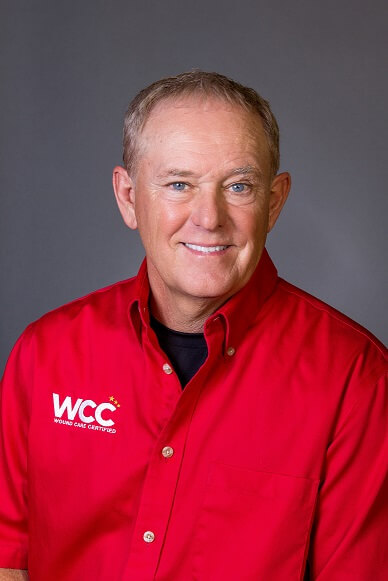For some people, teaching is in their blood and is a big part of who they are.
Scott Batie, MPT, RPT, MEd, WCC, a clinical instructor with our Wound Care Education Institute (WCEI) for 14 years, is one of those people.
He has been involved in the teaching profession for much of his life.
During college, Batie was a wrestler. After receiving his undergraduate degree, he taught high school English while coaching a high school wrestling team.
Batie realized he loved teaching and caring for others but wanted a change of pace and profession. After some thought and consideration, he decided to pursue a degree in physical therapy.

Scott Batie, MPT, RPT, MEd, WCC, clinical instructors for WCEI, went from a being high school English teacher and wrestling coach to a career as a physical therapist and wound care expert.
“My first job as a PT was in long-term care,” he said. “I replaced a PT who was doing the wound care at the facility.”
Batie said providing wound care was part of his job expectations, so he jumped right in and performed wound care and physical therapy.
Having just learned the basics of wound care while in PT school — such as the importance of keeping wounds moist and covered, as well as sharp debridement techniques — Batie said he began to learn more on the job in his new role as a PT and wound care specialist.
Batie ended up working in long-term care for eight years, then moved into the acute care environment for five years.
He became certified in wound care in 2005 after attending WCEI.
Differences between acute and long-term care
When comparing the two practice environments, Batie said there are some differences between acute care and long-term care.
But he said he believes wound care is a larger part of the long-term care environment.
“While we had some patients who were in the short-term stay area of our facility who needed temporary care for a recent stroke or hip surgery, other patients were in a state of permanent immobility,” Batie said. “These types of patients had wounds because of their long-term immobility, along with the fact that many are malnourished.”
As a result of the long-term immobility in the long-term care environment, he saw more pressure injuries.
In the acute care environment, Batie saw more variety regarding the conditions and wounds patients experience.
Sometimes he would treat patients for pre-surgical wounds when physicians would request he clean up wounds before a surgery.
Other times, his wound care involved:
- Post-surgical wounds.
- Caring for stroke patients.
- Caring for patients who needed range of motion work from total hip, knee and shoulder joint replacement surgeries.
One big medical issue in both settings is diabetes, Batie said.
“Diabetes takes its toll on the entire body and different body systems, along with causing diabetic foot ulcers and the loss of body parts as a result of amputations,” he said. “Treating wounds related to diabetes and helping patients adapt to the changes they experience after an amputation with amputee training was also an integral part of the work.”
Perfect fit for wound care teaching
Batie joined WCEI as an instructor soon after he earned his WCC certification in 2005.
“They needed instructors at that time,” he said. “And in addition to my years of experience as a PT and wound care specialist, I also had a master’s degree in education. I had both the experience and the educational background. When the opportunity came up, I took it.”
While teaching WCEI courses, Batie said he often feels students need someone to help them embrace changes to their practice and how they view the care they provide.
For example, a skilled wound care clinician can make a big difference in patients’ lives by:
- Helping patients heal their wounds.
- Decreasing odors from patients’ wounds.
- Decreasing the pain patients experience daily from wounds.
- Decreasing patients’ overall disability.
“You can really touch another person’s life and make a difference,” he said. “I enjoy teaching my students how to achieve this. That’s why I love what I do.”
Take a wound care course today to work toward your own certification!
What do you think?

